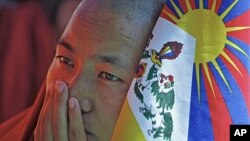In recent months several Tibetan monks and nuns have set themselves on fire to protest China's rule in Tibet. The attempted suicides have drawn an angry response from Beijing officials who claim the protests are linked to acts of terrorism and sponsored by the Dalai Lama. The harrowing incidents mark an escalation in tactics opposing Beijing’s rule.
Since May, nine Tibetans have tried to commit suicide by setting themselves on fire. The most recent was the first woman, a Buddhist nun. Five monks have died from their wounds. All of those who have attempted political suicide have been under 24 years old.
As in the other suicide attempts, the Buddhist nun named Tenzin Wangmo shouted out protest slogans calling for the end of China's rule, for religious freedom and for the exiled Dalai Lama to be allowed to return to Tibet.
Most suicides have taken place in the small town Aba, in Sichuan Province which neighbors Tibet and has large Tibetan communities.
Chinese governement reacts
The Chinese government says the acts, which have sparked other protests around the region, go against the beliefs and scriptures of Buddhism.
But Columbia University Tibetan scholar at Robert Barnett disagrees.
"There are records, a very few, but references to self-immolation as a religious practice in the mythical past, where people did it to show devotion to Buddha. So we can not say completely that this is not a Buddhist practice, it has happened in the ancient past," he said.
But unlike ancient history, all of the recent self-immolations have been viewed as political statements. Tibetan exile groups have held candlelight vigils to remember those they call martyrs and urged others to not let their actions be forgotten.
Unprecedented motivations
Barnett says the taking of one's life by self-immolation as a political demonstration is unprecedented in the Tibetan protest community.
"We have to be clear. This form of protest by burning oneself to death or setting oneself on fire is really completely new in modern Tibet," said Barnett. "We do not really have any precedent for this... As a political practice this is completely new."
The self-immolations started after the Chinese authorities in Beijing ordered a curb on religious freedom by forcing monks into patriotic education sessions. Officials made monks renounce their spiritual leader the Dalai Lama and study communism.
The monks protested vocally in their monasteries so the Chinese authorities took action.
They placed small police stations inside some monasteries and cut off water and electricity supplies at others.
Once the self-immolations began, authorities responded by sending in more riot police to Aba to prevent copycat suicide attacks. Some of the police are armed with fire extinguishers.
Barnett says the protesters actions reinforce an image of oppression from Chinese authorities.
"It is very important because it indicates to all Tibetans, that they stand out to be a sign of extreme desperation," he said. "It is still a choice of last resort. In other words, Tibetans do not see this as strategic, as a way of getting attention. They see it as a way indicating that the pressure on these monks is so great that they do not feel they have any other choice."
For Tibetan exile groups, there is a consensus that the Chinese government is to blame for the deaths.
"Young Tibetans are courageously giving their own lives to draw international attention to one of the greatest and longest standing human rights crisis in Tibet," said Stephanie Bridgen, director of London-based Free Tibet organization.
Western criticism
Western governments have released statements that generally concur with the view that Chinese tactics are contributing to the situation. Last week, the U.S. State Department called on Beijing to resolve the underlying grievances of China’s Tibetan population.
Beijing has strongly disputed that view and continues to describe the self-immolations as the end result of terrorism carried out by the Dalai Lama and Tibet freedom movements.
Chinese Foreign Ministry spokeswoman Jiang Yu said Beijing's primary concern is to keep what she describes as normal social order in Sichuan and Tibet. She calls the self-immolations “splittist activities” which is how the Beijing government describes Tibetan independence moves. She also called it terrorism in disguise.
Beijing invokes terrorism
Colombia University's Barnett says this is Beijing's standard response.
"Whenever there is a protest in Tibet, that the Chinese find is of an unacceptable kind, this is a standard response. Yet they have not yet told of any evidence of what we might consider terrorism," he said.
China’s Foreign Ministry is also not saying if it has contacted Indian authorities to pursue terrorism charges against Tibetan exile groups based in the country.
China has said that other governments commenting on the matter should refrain from doing so. Beijing officials responded to U.S. calls for respecting the rights of Tibetan and other Chinese citizens by saying that Washington should not meddle in China's internal affairs.




